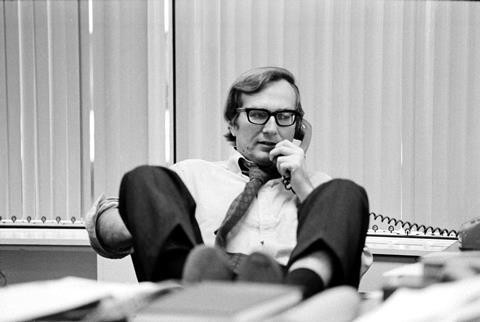Poitras and Mark Obenhaus follow Hersh’s career reporting on the likes of Vietnam, Watergate and Abu Ghraib

Dirs: Laura Poitras, Mark Obenhaus. US. 2025. 117mins
American investigative journalist and author Seymour Hersh has lived one hell of a life, finding himself at the heart of some of modern history’s most high-profile scandals – Watergate, US military wrongdoing during the Vietnam War and, more recently, at Abu Ghraib. But, as this enthralling documentary makes clear, this is no act of luck. Hersh is a driven, tenacious man who feels compelled to do all he can to expose moral wrongdoing, and he is also a fascinating, personable narrator.
Tantalizing story and balanced filmmaking
That makes him the perfect subject for this film by the directorial team of Laura Poitras – who previously documented a different kind of whistleblower, Edward Snowden, in Citizenfour (2014) – and filmmaker/producer Mark Obenhaus (feature Steep, TV series Peter Jennings Investigates). Cover-Up plays out of competition in Venice, where Poitras won the Golden Lion in 2022 for All The Beauty And The Bloodshed, about artist Nan Goldin. That documentary went on to be Oscar-nominated, and this could follow a similar path; distributors and audiences are sure to be tempted by the combination of tantalizing story and balanced, clear-eyed filmmaking.
While Obenhaus has previously collaborated with Hersh on other projects, Poitras has been waiting to make a film about him for over 20 years. It’s never made clear what compelled Hersh to finally say yes; although, now in his late 80s, there is a sense he is laying down his legacy (he published his memoir, Reporter, in 2018). At various times, Hersh questions his own motives for filming, frets about making his notebooks public, wonders if he can extract himself from this difficult business of stepping out from behind the written word.
Poitras and Obenhaus choose to keep all this candid self-doubt intact, their voices a reassuring, probing off-screen presence as Hersh sits at his overflowing desk and discusses his career. That really began, as does the film, with his reporting of the Vietnam War – more specifically, of the 1968 My Lai massacre in which around 500 unarmed Vietnamese villagers were killed by US Forces. Editing from Poitras, Peter Bowman and Amy Foote is simple and direct. Hersh’s yellow notebooks, covered with mostly illegible scrawl, are used alongside archive footage to illustrate his vivid recollections of uncovering these shocking events; work which saw him win the 1970 Pulitzer Prize for international reporting.
Even though Hersh’s bloody-minded tenacity put him on the wrong side of many influential people – including powerhouse secretary of state Henry Kissinger and President Nixon, who describes him, on a tapped phone call, as “a son of a bitch who is usually right” – he ploughed on. Later, Hersh would be the first to break the news that the men involved in Watergate were working for the CIA. Now-famous Washington Post Watergate reporters Bob Woodward and Carl Bernstein (themselves the subject of 1976 feature All The President’s Men) are amongst the luminaries and contemporaries assembled to discuss Hersh’s work. The mix of anecdotes and analysis provide some welcome background colour as Hersh avoids speaking much about his personal life, preferring to stick to the safer ground of his career.
Poitras and Obenhaus do coax out some more unguarded observations. Hersh briefly touches upon his Jewish parents, Isador and Dorothy, who emigrated to Chicago from Lithuania and Poland in the 1920s. He recalls his early days working for his father’s laundry business and his convoluted route to university, and explains how his psychologist wife, Sarah Klein (who doesn’t appear in the film), helps him stay grounded. Emotions certainly run high as he recalls the horrific details of stories like the My Lai massacre. And it’s certainly tough to look at pictures of the torture of detainees at Abu Ghraib by US soldiers, which Hersh obtained to blow the story wide open in 2004.
Crucially, Poitras and Obenhaus are careful to steer clear of hierography. They do not shy away, for example, from discussing a misstep in 1997, when Hersh wrote The Dark Side Of Camelot, an expose of John F Kennedy’s presidency, and used (as research) love letters from Marilyn Monroe that turned out to be fake. They also quiz him on the validity of his often-anonymous sources, and whether they can – or should – be trusted beyond the mere fact that Hersh has known them for decades. Hersh is defensive of his methods, but also pragmatic in his acknowledgement that he has made mistakes.
Interestingly, the film also includes archive footage of Hersh being accused of treason by members of the public for daring to suggest that the US military is anything other than patriotic and honourable. He remains defiant in the face of such criticism. “There is a history in American that is hard to write,” he says, early in the documentary. Cover-Up pays fitting tribute to a man who has made it his life’s work to seek out and expose the hardest of truths.
Production companies: Praxis Films, Project Mockingbird
Producers: Yoni Golijov, Mark Obenhaus, Laura Poitras, Olivia Streisand
International Sales: MK2, intlsales@mk2.com
Cinematography: Mia Cioffi Henry
Editing: Peter Bowman, Amy Foote, Laura Poitras
Music: Maya Shenfeld
























